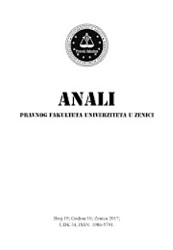STATUS DJELA SIROČADI U SISTEMU PRAVA INTELEKTUALNOG VLASNIŠTVA
LEGAL STATUS OF ORPHAN WORKS IN THE INTELLECTUAL PROPERTY SYSTEM
Author(s): Dunja Rojević, Maja ŠuputSubject(s): EU-Legislation, Comparative Law
Published by: Pravni fakultet - Univerzitet u Zenici
Keywords: intellectual property; copyright; orphan works; Orphans’ Work Directive;
Summary/Abstract: “Orphan works” represent a specific category of copyrighted works, and therefore their position in the intellectual property system is specific. Namely, the subject of copyright protection is an author’s work, as an original, intellectual achievement from the literary, artistic and scientific field, which has an individual character. The author is usually the copyright holder. However, if the author of the work or his legal successor, or the right holder in general, is not known or is known, but it cannot be located, then such a work is considered as an “orphan work”. A large number of orphan works are still protected by copyright, but modern times impose the need for their digitalisation, in order to make these works more accessible to the general public. This means establishing a legal framework that will facilitate the digitalisation and dissemination of copyrighted works, for which no copyright holder can be identified or found. The European Union, with its legislation, primarily the Orphans’ Work Directive, has tried to guide Member States on how to regulate the protection and the use of these acts, with a goal to harmonizing national regulations, but this process is not yet complete due to different archives, and it will still take a long time. These works, whose authors are unknown or cannot be found, form a significant part of the world cultural heritage, but they cannot be used prior a careful search is carried out in order to determine their authors, in compliance with the prescribed conditions. In this regard, and with the aim of more adequate protection of authors, even those unknown or those who cannot be located, it is necessary to harmonize BiH legislation with European Union regulations.
Journal: Anali Pravnog fakulteta Univerziteta u Zenici
- Issue Year: 15/2022
- Issue No: 30
- Page Range: 289-302
- Page Count: 14
- Language: Bosnian

